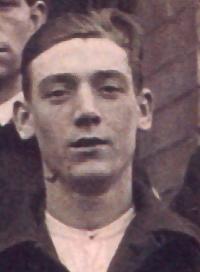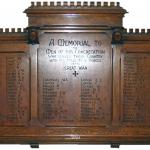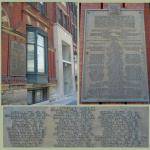BX September 30, 1914
Sent Farewell To His Mother – Private Betts Wrote After Brantford Boys Had Embarked For England
The following letter was received from G.F. Betts of the Fourth Battalion, Overseas Contingent, and formerly of the Dufferin Rifles. It was addressed to his mother and was written on board ship. That there are no “fungers” among the Brantford volunteers is shown by the fact that although the week before the troops began to leave all were given the opportunity to return to their homes if they so wished, none of the local contingent availed themselves of it. The letter reads:
September 26, 1914
Saturday
On Board S.S. Tyrolia
Dear Mother,
Just a few lines to let you know that we are about to sail. We left Valcartier Friday afternoon and embarked at 9.30 p.m., Friday night. This boat is a C.P.R. liner.
We are lying off shore about midway in the St. Lawrence opposite Quebec. We were marched direct from the train to the ship, so had no time to see anything of picturesque Old Quebec. We will likely sail at any moment. They are vaccinating everyone who cannot show vaccination marks. I have the marks, so I guess I am alright. We were served with a meal as soon as we got on board. First time we have sat at a table since we left home. Seemed queer getting back to a table again.
We are going third-class – somewhat better than was expected. The food is good, much better than in camp. Our whole battalion is on board and we are pretty well crowded. There are four berths in our stateroom. Will is just across the passageway. They gave everyone a chance to go home last week. We are going to stick with the show and see it through. The boys have nothing to do but to eat and sleep till the end of the voyage. Don’t worry about us. We will take some hard-tack with us and they are bullet-proof.
We are likely to stay in England for some time to get a final polishing up before we take a crack at the Germans. Will has been made assistant to color-sergeant, so he is making out alright. Hoping all are well, your affectionate son,
Frank
BX May 14, 1915
Cheerful Letter From a Wounded Soldier – Private Betts is Eager to Get Back to the Firing Line to Get Even With the Germans – Has Been in Many Hospitals Since He Received Injury
Such a thing as being downhearted never seems to be the case with a British soldier, whether he is from the Old Land or from the Dominions overseas. Under the most trying conditions with everything apparently adverse to cheerfulness, the old time spirit breaks through the gloomy surroundings. This is the case with Private Frank Betts, of this city, who at last word was in a hospital on the French coast, recovering from the effects of a bullet through the shoulder. His one hope is that he will be able to get back and account for enough of the enemy to put a stop to the war. His latest letter, dated April 28, and received this morning by his parents here, is as follows:
April 28, 1915
Pte. F. Betts
No. 11655
16th Section, A. Company
4th Canadian Battalion
British Expeditionary Force
1st Canadian Division
Dear Mother and all,
Just a few lines to let you know I am alright. I guess you would see by the papers what we have been doing. I sent you a card as soon as I could to let you know I was still amongst the living. I only got one through the right shoulder on Friday, the twenty-third, and was lucky I only got that, to what some of the poor fellows got. The bullets flew through the air as thick as hail at the beginning of winter. I don’t know how Bill came out of it. I never saw him but I hope he was as lucky as I was. I witnessed some awful sights but they never bothered me any. I thought it would. The Germans used gas shells, but they couldn’t make our boys retire. I have been in about a dozen hospitals since I was hit – had a sea voyage on the Red Cross ship – but I am still in France in another hospital. That is what they call it, but it is just a camp of canvas huts. We get well fed. I’ll be as fit as ever in a few days.
I was in the Australian hospital not far from Calais, and they treated us with the utmost kindness and gave us all we wanted to eat, drink and smoke. There was one of the British regulars of the First Suffolk Regiment next to me, with the same name as mine. It was a coincidence. When I awakened on Tuesday morning the orderly told me there was another Frank Betts. I thought it was Bill, who had put down my name by mistake. They gave us oatmeal porridge – the first since I left home. I lost everything on the field, even my razor, the one I had for nine years. I tried my best to save some things, but I was lucky to get back myself, I guess. Now don’t throw a fit when you see my name in the paper or read this, as I am not badly hurt, and will soon be able to be with my company again, and I hope that I get enough of them next time to end the war. I am sketching this in the “Y.” they have here. I sure have done some travelling since I’ve been in this country.
This city near here is a large one. I would tell you the name, only they would mark it out. It is on the coast. Can you guess what it is? Well it is almost time to go to my flop, so will bid you all a kind good night, and hope to see you all this summer.
With love to all, your affectionate son,
Frank
BX May 1915
Germans Fired From Three Ways at Once – Private George Frank Betts wrote home from Cardiff Wales
I suppose you saw in the papers about the 4th Battalion. Our Colonel Birchall got killed. He sure was a brave man. He went up the field just as if there was no war on, and the bullets, shrapnel, Johnsons and war shells were as thick as hail, and I am not exaggerating. I only got about half way across the field when I got mine. How anybody got through it without being hit, is a miracle. After I was hit, they tried to get me again. I got my trenching tool out with my left hand and dug a little hollow to lie in and the bullets hitting the ground all around me; three shrapnels burst so close I was nearly buried and a piece of shell hit the handle of my trenching tool, just missing my head by about two inches. I lay in the open with the beggars sniping at me and wondering where the next shell would burst. Then I made up my mind to beat it for cover. How I got away without getting hit again I don’t know. The bullets threw up the ground all around me. I must have had a charmed life that day. I got away lucky to what some of the poor fellows got. It was awful. I don’t want to see another day like that one. I got back to a farm house, about 1,000 yards from the German line. They shelled it all day and the house was just packed with wounded – some of the poor beggars got hit again. I lay in the cellar till ten at night, then beat it. The shells were still flying, but I got away alright. The Canadians covered themselves with glory, but look at the cost.
Bob McCartney is here in the next cot to me, he got one through the left leg. I never saw him. We started the battle that day. We fell in at 1 a.m. and marched along in the darkness till it got almost light, then we got into the slaughter. It was simply murder to go across that field; it was as level as a billiard table, and the Huns had machine guns and every other kind; had us under fire from three ways and the men went down like wheat. People at home have no idea what a modern battle is like, but take it from me; it is simply hell on earth. The ground trembles when those Jack Johnsons burst. It was a wonderful sight to see our boys advancing in a long line with bayonets fixed. The Germans don’t like the Canadians any more than they do the Gurkhas.



